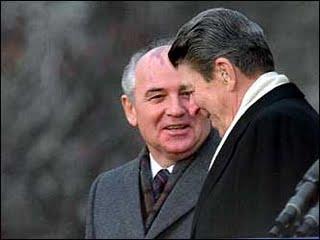By 1989 his perestroika, or reconstruction and opening, was in full swing. Andrei Sakharov, Russia’s most famous dissident and nuclear scientist, returned from his forced exile in Gorky and was elected to the first Soviet parliament. Banned films and books flooded the intellectual space. The physical space also opened up, as Russians started to travel to the West.
The idea of sending tanks to stem velvet revolutions in Eastern Europe was unthinkable. Mr Gorbachev told Communist leaders in Eastern Europe that Moscow would not interfere in their domestic affairs as early as 1985. The leaders did not believe him, or did not want to share the news with their people—for once Soviet soldiers and subsidies were removed, their own days would be numbered.
When Mr Gorbachev visited Prague in 1987, the Czech people asked him to stay. In Tom Stoppard’s recent play, “Rock ’n’ Roll”, Jan, the Czech protagonist, explains to a British reporter: “When Gorbachev and the beautiful Raisa smile and wave, the Czech people go crazy… When we were reformers, the Soviets invaded. Now the Soviets are reformers, they have discovered a deep respect for Czechoslovakia’s right to govern itself.”
Mr Gorbachev had his own “Jan”. His best friend at Moscow State University was Zdenek Mlynar, a young Czech communist who later became a leader of the Prague Spring. (Subsequently he was ejected from the Communist Party and then from the country.) When Mr Gorbachev became general secretary of the Communist Party, Mlynar was one of the few foreigners who knew him well: “We are talking about a man who attributes more importance to his own experience, lived and felt, than to what is decreed on paper.”
Mr Gorbachev’s pre-war childhood in the southern Russian village of Privolnoe (roughly translated as “free”) formed many of his sensibilities. Both his grandfathers were caught in Stalin’s repression. One rejected collectivisation and was sent to fell trees in Siberia in 1934; the other embraced the new farm policy but was arrested in 1937 as “an enemy of the people”. He was let out, but the memory of his interrogations (blinded with a bright lamp, wrists slammed in the door) and family stories of the famine caused by collectivisation in one of Russia’s most fertile regions stayed with Mr Gorbachev for life.
In his grandfather’s house, works and portraits of Stalin and Lenin peacefully coexisted with Russian Orthodox icons. Mr Gorbachev saw no clash between Lenin’s words and peasant life. He did not question the role of Stalin until after the tyrant’s death. But he cringed when a classic Stalin-era comedy, “The Cossacks of Kuban”, painted a picture of abundance in Russian villages. He told Mlynar it was a lie.
The beginning of Mr Gorbachev’s political career coincided with Nikita Khrushchev’s denunciation of Stalin’s personality cult in 1956 and attempts to de-Stalinise the country. In 1967 Mlynar privately came to see and talk to his old university friend. They shared the thoughts and feelings that inspired both the Prague Spring and Russia’s “thaw”. But when, in August 1968, Soviet tanks rolled into Czechoslovakia, they also crushed the hope of reform in Russia. Mlynar, with other reformers, was delivered to Moscow and forced to sign a protocol of political surrender. They called it “normalisation”. In reality, it was anything but.
Mr Gorbachev did not protest. But once again he trusted his own eyes and senses when, a year later, he visited Prague. He did not see Mlynar, who by then had retreated and worked in a museum; that would have been political suicide. But he saw anti-Soviet slogans and hostile workers who refused to talk to the Russian visitors. It was an uncomfortable trip. “I felt, in my guts, that this [Soviet] action was rejected and condemned by the people.”
In many ways Mr Gorbachev’s perestroika was a belated fulfilment of the Prague Spring. His achievement was not in making great intellectual discoveries, but in spelling out publicly what people had said and thought in their Moscow kitchens for years: that people in the West lived better than in the Soviet Union, that the Soviet economy was inadequate and that “we can’t go on living like this any more.” This was common sense. Saying it openly, however, was a breakthrough.
Mr Gorbachev was neither a dissident nor a revolutionary. He was a man of the system through and through. “Nobody rose to power in the Soviet Union despite the system. Nobody. And neither did Gorbachev,” wrote Alexander Yakovlev, one of his close allies. This constrained him in some ways, but it was also a condition which made reforms possible.
Dismantling the Soviet Union was the last thing on Mr Gorbachev’s mind. He believed that socialism and democracy were complementary, and his reforms were aimed at preserving and renewing the country. It was his faith in socialism, his human instincts and legitimacy within the system that set eastern Europe free.
For him this was a question of values, not geopolitics, as Russia’s rulers believe today. Unlike them, he had no siege mentality, and needed no Berlin Wall to huddle behind. From their point of view, which is now taught in schools, Mr Gorbachev naively gave up Russia’s “security belt”, getting nothing in return. They would not have made the same mistake.




 By: N. Peter Kramer
By: N. Peter Kramer
